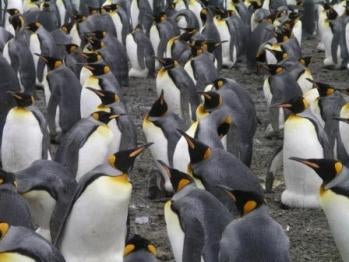
A visit to one of the King Penguin colonies on the island of South Georgia is very much like going to a huge rock concert. Everywhere you look there are thousands of penguins, on the plains that fringe the seas and higher up on the tussock grass looking down at it. And everybody is making a noise. The real standouts are not humans, who can move without fuss among the crowds if they stick to penguin speed, but the chicks that haven’t moulted yet and look incredibly dumb. I’ve been lucky enough to spend a while on the island, on the way to Antarctica, and to see its penguins and many albatrosses as well as the rare South Georgia pipit. It truly is a paradise for wildlife so I was thrilled to read that
a large-scale plan is being developed to rid the entire island of the rats that continually threaten its bird populations and are eating millions of eggs and chicks each year.
This might seem like an impossible task as the island is over 100 miles long, far larger than any other island that has been cleared of introduced pests. Luckily glaciers divide up the island into manageable areas, making it feasible to tackle each of the rat populations by dropping poisoned bait from helicopters. Those same glaciers also set a deadline for the operation. As a result of global warming they are shrinking rapidly and soon will cease acting as barriers to the free movement of the rats all over the island. When that happens, wiping out the rats will become impossible. With luck, and a grant from the British Government, work can begin in 2011.
Another lesser problem will still remain in the booming populations of fur seals. There are so many on the beaches of South Georgia now that getting ashore from a Zodiac boat often involves a tussle with seals ready to fight off intruders into their territory. Only the enormous elephant seals slumbering among them seem unconcerned. As seal numbers have grown, they have moved further and further inland looking for space and ended up crowding out albatrosses and other birds nesting in the tussock grass. Some say that the boom in seal numbers is due to the hunting and disappearance of whales that would have harvested the sea’s riches before the seals got to them (both eat krill). Whether that is true or not, a cull of fur seals may prove necessary, although it is very controversial.
Clearing South Georgia of rats would be an enormous victory for its bird populations, allowing them to flourish into the future. It is an issue I’m really sensitive to right now, as I am in New Zealand visiting several citizen-led projects to fight back against introduced rats, mice, stoats and even wasps, to let indigenous birds, including the kiwi, to be seen again, in enclaves near, and even within, cities. I’ll be writing more shortly.


